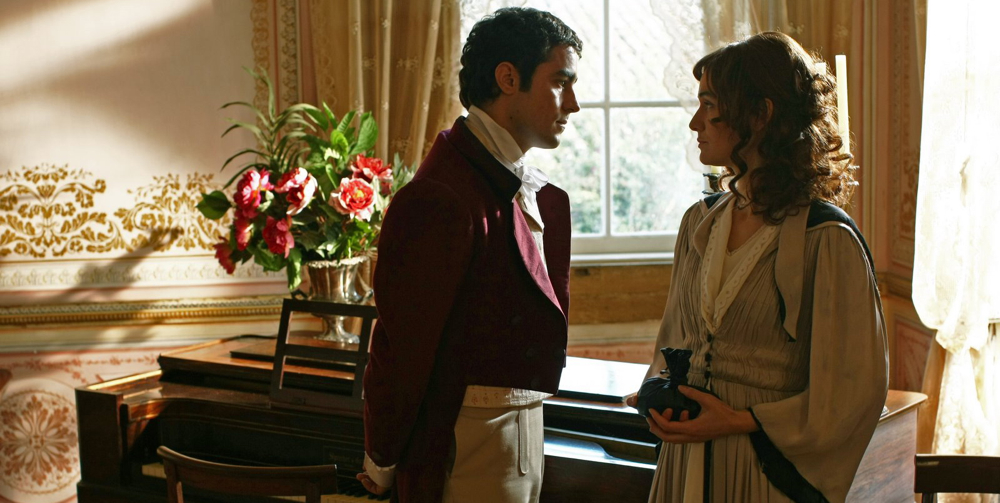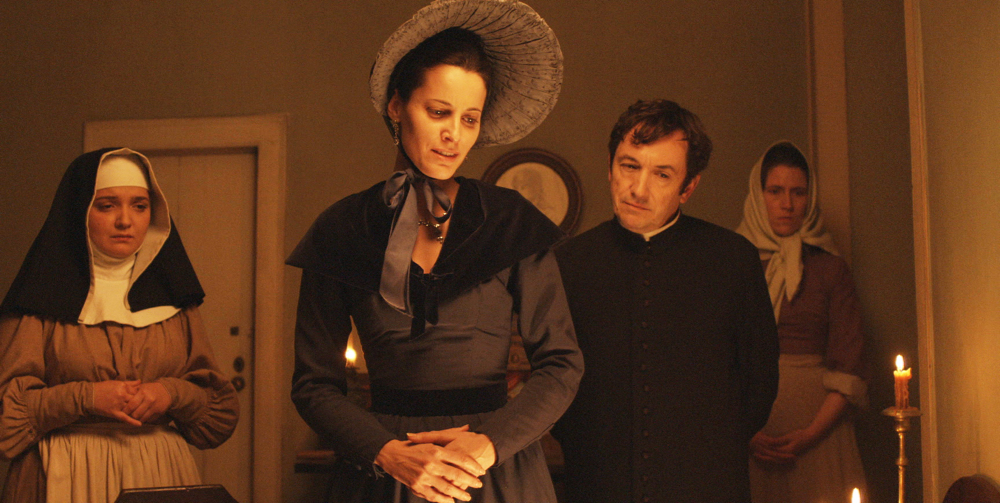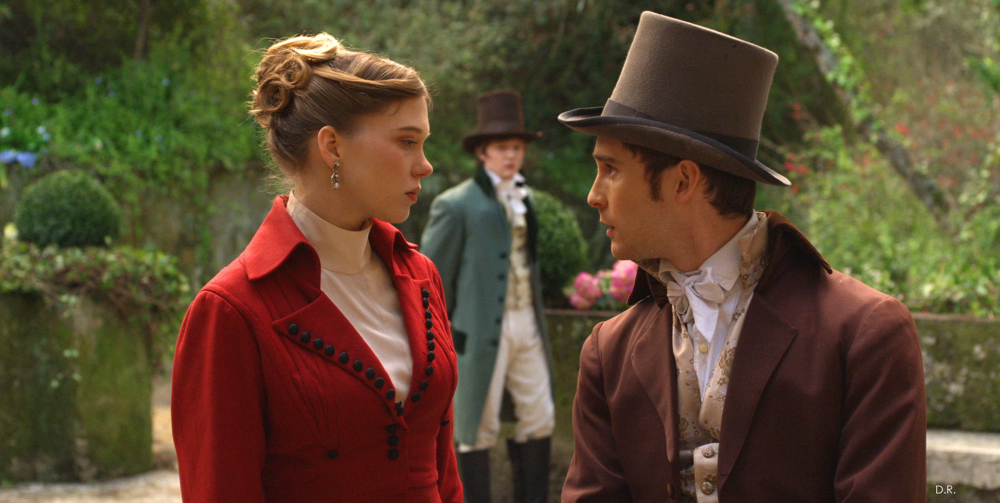
I've been following Tom's Portuguese Literature Challenge reading lists over at Wuthering Expectations—and as a result my eye, on the lookout for things to do on a holiday weekend in Seattle, was caught by the description of Raul Ruiz's Mysteries of Lisbon. Adapted from a novel by the extremely prolific but barely translated 19th-century Portuguese novelist Camilio Castelo Branco, this nearly five-hour film seems at first glance a standard costume drama, albeit with rather more stunning cinematography. (Really stunning. Seriously.) As it turned out, though, Mysteries of Lisbon is more interesting than that.
Not in terms of plot. Any of the actual plot points here would be familiar to readers of Dickens, Collins, Brontë, or any other craftsman of Victorian-style melodrama. You've got your orphans, your rakes, your naive maidens, your hushed-up scandals, your duels and battles, your lovers expiring tragically in each others' arms, your picturesque descents into madness, your judiciously-placed revelations of previously-unsuspected parentage...you know the drill. What distinguishes Mysteries of Lisbon is its structure: rather than a narrative in which a multitude of disparate threads eventually come together into a neat conclusion, Lisbon presents a forking, open-ended structure in which each character's narration leads to the narration of another character. And while the details of each narrator's life do relate to and sometimes explain the details of others, each section raises at least as many new questions—and new avenues for potential in-depth exploration—as it resolves.

A concrete example: we begin the story with narration by young João, an orphan and ward of a provincial Catholic school, who is consumed by curiosity about his unknown parents. As he learns more about his origins, we're introduced to his mother, Angela de Lima, and the priest who runs the school, Father Dinis. The film branches away from João as Angela narrates the story of her life with her brutish husband; then branches again as Father Dinis narrates the story of how he met João's father; then branches yet farther as we get narration from João's father's point of view. In the course of all these stories we are introduced to further characters who later become narrators or primary players in another character's narration: Angela's count husband has a narrative section, as do Father Dinis, charismatic semi-pirate Alberto de Magalhães (played superbly by Ricardo Pereira), a Parisian ex-lover of Magalhães's, the elderly priest Father Dinis meets when attending the count's deathbed, and so on. With each branch of the story we encounter more details and secondary characters whom we suspect might become central in a future section; some of them do, while others remain cyphers. I imagine that one reason for the film's five-hour running time is simply to demonstrate the potential infinitude of this method of storytelling: there's no narrative reason it could not continue on, branching here and there, indefinitely.
Despite the film's unusual narrative technique, I don't want to imply that the viewer is left with a huge number of significant questions at the end of five hours. However, there are quite a few tantalizing suggestions that gesture at the open-endedness of the world presented here. Along with that open-endedness, I think, goes a certain faint whiff of the bizarre or grotesque: the film featured the occasional surreal detail (Magalhães's oddly mincing footman, for example, or the pacing background figure in the duel scene) presented without any explanation whatsoever, in a way that reminded me of David Lynch's Twin Peaks. It would take multiple viewings to track properly all the questions answered, let alone all that are asked, but here's what I was left wondering about, or interested in paying attention to on a re-watch:
- Father Dinis and his relationship with his "sister"; we never get the back-story here, and it's one of the most intriguing teases of the film. Possibly, we could deduce more based on early clues.
- Who is the kid walking back and forth in the background of the dueling scene, who then shoots himself after everyone leaves? There might actually be evidence of this in the film, but if so I totally missed it. It's a great example of Ruiz's use of the subtly bizarre, though.
- What's with all the characters falling over and having fits? Is João/Pedro epileptic? Is Father Dinis's father epileptic? Is there some kind of implied heredity there? Or is everyone just prone to swooning?
- Two back-stories we're explicitly denied concern the relationships of Eugenia—why doesn't she accept the money left to her by her lover, and how does she then end up married to Magalhães? We hear that she wants to tell Father Dinis her story, and we see the priest sitting at her table right after (presumably) having heard the story, but we never hear the story ourselves. This is the kind of trick Mysteries of Lisbon loves to play.
- Magalhães's semi-abusive relationship with his prance-y, occasionally violent manservant: delightfully weird, and never explained beyond Eugenia's offhand comment that the servant is "ill."
- There's a hilarious and affecting recurring motif of people (often servants) observing others through doors, windows, and other apertures. In one scene, for example, adulterous lovers who have just been found out by the woman's husband ask each other in consternation, "But how could he know? We were so careful!" Meanwhile, servants are watching them through at least two unbolted and un-sashed windows, creating an effect that's both funny and slightly sinister. In several other scenes, lovers woo while a third person looks on, raising the question of how the observer affects the scene unfolding, whether the lovers know they are being observed or not.

I'm so glad I got the chance to see Mysteries of Lisbon on the big screen, and it's the kind of film I hope to see released in some kind of Criterion Collection or special boxed DVD. Given that Branca's homonymous novel isn't yet translated into English, what I would most hope for from such a set would be clues about how much of the film's technique is taken from the novel—and how many of its lingering questions.
Oh yes, and I picked up a few books in Seattle, as well! I was going to avoid Elliott Bay Books in an effort to save money and space, but when it turned out that David was generously treating for food and lodging on this little trip (thanks, Sweetie!), and when, in addition, Lena pointed out on Twitter that the shop features bargain tables, and when, on top of all that, we ended up enjoying a delicious meal and wine next door at the Tin Table...well, enough of the excuses. Here's the loot. Except the Donoso these were each only five dollars, so I don't feel too decadent.
From the bottom up:
- The Selected Works of T.S. Spivet by Reif Larsen is the farthest I've diverged from my "comfort zone" in quite some time, as it was marketed as a Young Adult novel and garnered mixed reviews on release. However, the multimedia, non-linear presentation and the low price of $5 were enough to tip the balance.
- The Obscene Bird of Night by José Donoso was recommended by David Auerbach as relevant to my disgust project.
- The Anthologist by Nicholson Baker was on my list due to Rebecca's strong recommendation over at Of Books and Bikes; the combination of meditations on poetry and meta writing-about-writing is intriguing.
- A Pale View of Hills by Kazuo Ishiguro, in an extremely appealing new edition I haven't seen before. This and Nocturnes are the only Ishiguro I haven't read: his first and most recent.
- The Feast of the Goat by Mario Vargas Llosa comes highly recommended by Richard (maybe I should say recomendado con insistencia par Richard, as the post is Spanish-only), and I very much enjoyed the only other Vargas Llosa I've read.
- The Talented Mr. Ripley by Patricia Highsmith, with which I'm already halfway done and which has broken me out of the reading slump in which I spent most of September. Good old Highsmith: why haven't I read more of her?



This does sound fascinating. It's by the maniac who thought it was a good idea to adapt Proust to film - but only the last volume! Definitely not a purveyor if standard costume dramas.
It seems so unlikely that the structure of the film is really pulled from the novel, but there is precedent. Melmoth the Wanderer, Charles Maturin's 1820 Gothic madhouse, is basically nothing but a series of nested stories.
The title might provide a clue, if I knew more about the subject, since it is one of the many Mysteries of [insert city] novels. I think Sue's Mysteries of Paris was first, but a flood followed: Mysteries of New Orleans, mysteries of everywhere.
In a way it seems unlikely that the structure is pulled from the novel, but in another way it seems even weirder that it wouldn't be. The storytelling technique is so textual in terms of being narrator- and conversation-based. It's not a very filmic strategy, having a story told through a long string of conversations in which 2-4 people all sit around and talk about their pasts. But in a book that format would feel less awkward, since it would simply result in several different first-person narrators. Anyway, I'm certainly curious. We need a native Portuguese reader!
It sounds like you had a wonderful trip! I hope the book the movie is from gets translated. I'm not much for movies but I would totally read the book if I could. Nice teapot too and nice pile of books. We've got the T.S. Spivet book at my house. Husband read and loved it last year and keeps bugging me to read it too. It looks really good so I will read it, just don't know when.
Yes, it was a great little trip! I'm glad to hear your husband loved the Spivet book—it's so beautifully presented, but I've heard mixed reviews of the overall execution. At least I'll have something pretty to look at while reading, though.
I love your loot from the bookstore! I just have to be honest that I haven't read any of those titles. But, you have me curious about Ishiguro's books and The Talented Mr. Ripley.
Thanks, Heidi. Ishiguro is one of my absolute favorite living writers—one of the few whose new releases I await with high anticipation. And Highsmith is classic suspense!
The film sounds very intriguing! I don't think I could manage five hours in a cinema in one go, though, so perhaps this is for the DVD (although like Stefanie, I'd read the book if I could!). Your purchases also look wonderful. I got very interested in the Spivet book last year, but it stayed so pricey that I took it off my wish list eventually. If there are cheap copies knocking about I will certainly chase one down.
It is definitely long. The film is divided into two halves, and there was a 30-minute intermission between them when I saw it; the cinema even allowed you to buy tickets for the first half on one day, then come back another day for the second half. But honestly, unless I needed to be somewhere I can't imagine not staying for the second half. There's kind of a cliffhanger at the end of the first half, and I certainly wanted to follow up on it (although as it turns out, true to form, the question it raises is never exactly answered). :-)
a great selection of books you brought and thanks for highlighting the Portuguese reading challenge ,all the best stu
Sure thing, Stu! Thanks for the nice words. :-)
Now that you've mastered the art of watching nearly five-hour long Portuguese films, Emily, I think you should turn your sights east and move on to the seven-hour long Hungarian films like Bela Tarr's Satantango for an encore. You go, girl! Really glad you reminded me about this movie because I heard about it somewhere and then promptly forgot about it (hope it's still in my movie-going neighborhood). It sounds wonderful. Also glad to see you had such a nice book haul in Seattle. Looks like nice additions for the home library. Cheers!
Haha, YES. Bela Tarr, here I come. Actually I have been meaning to check out his work for a while now; maybe Ruiz can be an effective entré. Glad to remind you about Lisbon, Richard, & would be curious about your thoughts if you get around to seeing it!
Thanks so much for the reminder, Emily--saw Mysteries of Lisbon yesterday and loved it. Fantastic storytelling, cinematography, and three new movie actress crushes for me! Now I really need to see if the book it's based on is available in English or Spanish translation because while Ruiz is obviously an über-talented filmmaker with his own sense of style, I have a feeling that a lot of the cool weirdness and sense of humor of the film are novel-derived (at least in spirit if not literally). I of course second your opinion that a Criterion double-DVD needs to come down the pike for the home video archives.
Oh good, I'm so glad you liked it as much as I did! What about that manservant??
And ooh, which three actresses? I thought Clotilde Hesme was pretty smokin', despite (or maybe a little because of) her character being totally insane with the weird inappropriate laughing jags. Also the actors who played Benoît and Magalhães...who were also pretty crazy, come to think of it.
I really hope you can get hold of the book - surely it's available in Spanish - and let us all know which of the storytelling techniques were original!
Ha ha, I liked the three actresses you pictured above with the countess who retired to the nunnery being an ever so slight preference over the (indeed) smokin' Clotilde Hesme and the Blanche de Montfort character played by that other attractive French actress. All way out of my league except in a movie theather fantasy, of course, but Clotilde Hesme would prob. be more my "type" in real life esp. with the crazy side of her character that she played so well! The mincing manservant? Great comedic touch, and along with the guy who killed himself after the duel, a nice argument in favor of a life is just a fever dream reading of the narrative as well as your Twin Peaks analogy. Like that Ruiz kept viewers off-balance with those kinds of things (and the moving camera while lovers were being spied on!) without going overboard about it. Two last things: 1) Couldn't find the book in translation, but I may give it a go in Portuguese, which I have never studied, as a long-term project. It's 500 pages long, though, so I am almost certainly doomed to fail! 2) According to Amazon, the movie is already on pre-sale for a December release. Not on Criterion unfortunately, but I want a copy so I will settle anyway. Sorry for clogging up your inbox, but this is such a cool movie to talk and think about!
ton commentaire est passionnant. Je vais passer le lien à Vincent qui pourra peut être répondre à certaines de tes questions. J'ai vu le film 2 fois, au ciné bien sûr, et s'il repasse j'y fonce à nouveau! Il est passé à la télé il y a quelques mois, dans une version un peu différente et en 4 épisodes; mais je n'ai toujours pas de télé....
Je préfère voir les films au cinéma (grands écrans et pas de téléphone qui sonne!).
Litlove: you could manage 7 or 8 hours with such a rich and fascinating film!
Ah, je serai curieuse d'entendre les commentaires de Vincent! Et je suis d'accord - chez le cinéma il y a quelque chose de spécial, bien que je n'y aille pas très souvent. :-)
en ce moment Vincent est très pris par le festival Lumière (les Frères Lumière étaient lyonnais): il voit jusqu'à 5 films par jour! il est fou mon fils!
tu sais que Ruiz avait fait "Le Temps retrouvé" d'après Proust en 2000. La critique n'avait pas été très bonne. J'avais certainement vu le film, mais ne m'en souviens même pas!
I hope you enjoy The Anthologist! Isn't the Highsmith great? I read it for my mystery book group sometime in the last year, and I loved it. It made me feel vaguely guilty the entire time I read it and like I was living in a dark cloud ... which doesn't sound enjoyable, but it was! The film sounds fabulous. I'm going to keep an eye out for it.